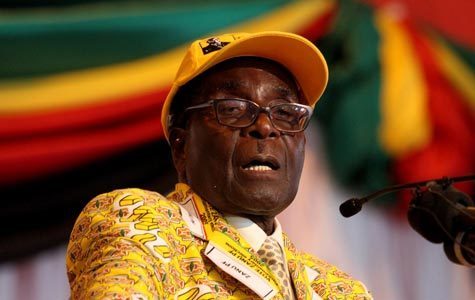
For the first time in Zimbabwe’s post-independence political memory, President Robert Mugabe was, on Friday, chastising security arms of government for meddling in political affairs of the country.
Standard Comment
He complained that “the military, police and the intelligence are now involved” in politics and ordered them to stop that.

That must come as a surprise to many Zimbabweans who had become used to public political declarations by security forces over the years.
The country’s constitution is clear about the illegality of security personnel involving themselves in political issues and it is quite refreshing to hear the president condemning this.
We watch with a keen eye and with great hope that President Mugabe maintains this stance even when election time comes. We do not expect to see the deployment of the military in the countryside where they have been sent before to coerce the electorate to vote for a certain party.
Previously, especially towards and during elections, security officers have made dangerous political pronouncements and when opposition parties complained, Mugabe gave them a deaf ear.
- Chamisa under fire over US$120K donation
- Mavhunga puts DeMbare into Chibuku quarterfinals
- Pension funds bet on Cabora Bassa oilfields
- Councils defy govt fire tender directive
Keep Reading
The most common entry point that the armed forces used into national politics which Mugabe supported publicly, was that of liberation war credentials being a prerequisite for Zimbabwe’s prospective leaders.
The sudden about turn by Mugabe comes as his wife, the First Lady Grace’s name is being thrown around among people tinkering with presidential ambitions.
The First Lady has no liberation war credentials.
While war veterans, including the late decorated commander Vitalis Zvinavashe spoke about State House incumbency being a straight jacket which only a person with liberation war credentials could wear, Grace described such people as brainless dreamers.
In the run-up to the 2013 elections, Zimbabwe Defence Forces Chief of Staff, Major General Martin Chedondo, grabbed newspaper headlines with a declaration of open allegiance to Zanu PF and a clear message that there was absolutely nothing wrong with soldiers meddling in politics.
Political parties and analysts immediately raised alarm. Chedondo’s utterances were “treasonous” and exposed Zimbabwe to a military coup, they cried.
But, much as the army chief’s proclamation was, as it should have been, as unnerving as it was dangerous, Chedondo was merely confirming what his superiors in the uniformed forces had already declared and which had the full support of the president.
Parties contesting for power in this country have read the soldiers’ position as a thinly-veiled coup threat in the event Zanu PF lost elections.
Allowing military involvement in national politics, as had become acceptable by Mugabe and his party Zanu PF, resulted in securocrats taking over the day-to-day running of political campaigns. As a result, members of the opposition and their supporters were besieged, arrested, beaten, chased away from their homes and sometimes murdered.
This is the reason why opposition parties have been running everywhere looking for security sector reforms. They have been pleading with Mugabe, as both president and Commander-in-Chief of the Defence Forces, to tell his charges to respect the law. They wondered why the president did not tell the securocrats to stop making bellicose political statements in support of particular parties.
Until this Friday, Mugabe had supported this militarisation of national politics. What we hope now is for the president to stand by his word, not only where his party Zanu PF is involved, but also when national elections take place.
We expect the president to stand up and tell the military to stay in the barracks and not to harass civilians during elections.
These are some of the demands that political contestants are asking for when they talk about security sector reforms.











